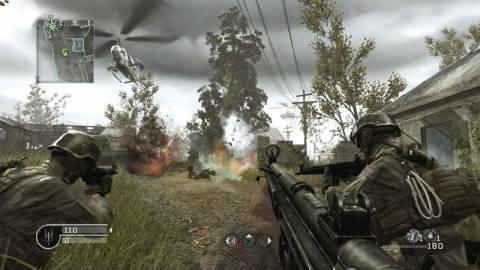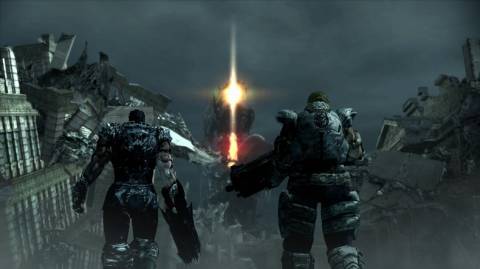The Sequel Stigma - How Conformity Is Breaking The Industry
By spilledmilkfactory 17 Comments
WUB WUBBA WUB WUBBB. WUBBA WUBBA WAAA.
Wobble bass. It's infiltrated practically every other video game trailer over the last 6 or so months, with Battlefield 3 and Goldeneye Reloaded just two of the most recent examples. Why is this the case? And more importantly, how does this one case serve as a microcosm for how the game industry at large works, and how is this mentality slowly killing our favorite hobby?
First things first, let's take a look at the game development process. At your typical studio, development begins with a spark, an idea from one of the development staff. The staff build on the idea, fleshing it out with new characters, worlds, powers, or story elements. Then they begin shipping it around to publishers. Typically, the build of the game that the team shows to the publishers is conceptually at least marginally different from the game that ends up coming out at the end of the dev cycle. The publisher, afraid that the developer's ideas might not gel with the massive audience necessary for a title to make back its budget, will closely scrutinize the product over the course of its development, recommending changes where they feel necessary. Of course, with the publisher's hands on the purse strings, these "recommendations" take on a somewhat sinister tone. Because games typically need to sell millions of copies in order to make significant profit, and because original games are by their very nature an uncertain proposition, both developers and publishers tend to gravitate towards sequelizing existing properties instead of creating new ones.

The video game industry shies away from creativity and uses sequels as a crutch. Big surprise, right? It seems like every gaming site on the internet is flush with fans complaining about Activision's repeated flogging of the Call of Duty franchise, amongst many other beloved franchises. These complaints, however, are missing the real point. A sequel, from the developer's perspective, is a chance to iterate and improve on an existing formula, a chance to surprise players who have been trained to expect a certain experience with something completely out of left field. Think about it. Activision's warfare franchise is infamous for hewing close to the blueprint, but it's this very same franchise that is credited with changing first person shooters as we know them with the original Modern Warfare. Bioshock Infinite, another sequel in an established and successful franchise, is betting it all by changing the setting, characters, story, and themes established by its predecessors drastically. It's a strategy that has already benefitted Irrational and 2K massively, with Infinite currently at the head of the race for Game of the Year 2012. Hell, even Black Box and EA's storied Need For Speed franchise has shaken itself up on a regular basis in the name of keeping things interesting, with this year's The Run looking like a fantastic take on the series' hectic racing pedigree.
No, sequels aren't the kryptonite of this industry as many make them out to be. In fact, I believe that sequelizing a franchise is a good thing, provided there are improvements that can be made to the original. Take a look at the Metacritic scores for the Assassin's Creed franchise, for example. The first game flew by with an 81, but after Ubisoft made many critical improvements to the formula, the second game's scores raised to an average of 90. The second sequel, Brotherhood, fared similarly, with an average of 89.
The problem comes when a developer is pressured, either by its publisher or by the successes of other franchises, to change their games in a way that makes them too similar to existing products on the market. Take a look at the shooter genre today. Modern Warfare changed how it was done four years ago, and the ripples of that game are still drowning the genre today. By trying to "beat" Call of Duty, EA's Battlefield series has been suffering an identity crisis for the last few years. Both Bad Company 2 and Battlefield 3 feature heavily scripted, and largely awful, campaigns designed to drum up the same kind of fervor that Call of Duty has been inspiring for the last few years. Only problem is, Battlefield isn't Call of Duty, and by trying to be, the games have lost some of their identity. Flash back to June 2008. The first Bad Company game had already been in development for years, and EA and DICE were feeling little in the way of pressure from Activision's monolith. They released Bad Company that month, and the resulting single player campaign was easily the best in the history of Battlefield. Open, full of humor and life, and taking place largely in a sandbox environment, Bad Company embodied everything that was fantastic about the Battlefield franchise, minus the intense multiplayer competition, plus an entertaining story complete with AI Russians to shoot. By trying to chase the White Whale of Call of Duty's success, EA and DICE lost the identity of their game's campaign, and lost its quality in the process.

The Battlefield games are still high quality products despite the lackluster nature of the recent entry's campaigns, but even worse is when a game completely crashes and burns under the weight of its conformity. Take Quantum Theory, for example. This game was developed by Japanese developer Tecmo specifically for the purpose of challenging the success of the Gears of War franchise. Unique elements, such as the living tower in which the game took place or the female partner who used blades instead of guns, were downplayed to the point that they barely mattered, while elements that echoed Gears of War were emphasized heavily. The only problem was that those elements were awful, and without any original properties to buoy it, Quantum Theory quickly crashed and was forgotten.
This conformity is no longer confined to game design. As mentioned above, the marketing of many games are similar as well. When dubstep exploded on the scene, Uncharted 3 ran a trailer for its multiplayer suite featuring a song from the controversial genre. Uncharted 3 is popular, as is dubstep. Now every other trailer on the site is backed by a repetitive dance soundtrack. That's the mentality that has become so poisonous to this industry. We, as an industry, need to recognize that the popular path is not always the one that will bear the greatest fruits. If every game studio went with what was popular instead of forging out on their own to create unique and beautiful visions, there would be no Modern Warfare, no Bioshock, no Grand Theft Auto or Assassin's Creed or Mario or Gears of War. In fact, these daring franchises actually tend to be the most popular upon their release, with each of the franchises named above flowering into highly profitable franchises and inspiring a slew of imitators. The sooner game companies realize that daring decisions can lead to the greatest successes, the sooner this industry as a whole can begin to surprise all of us again.
